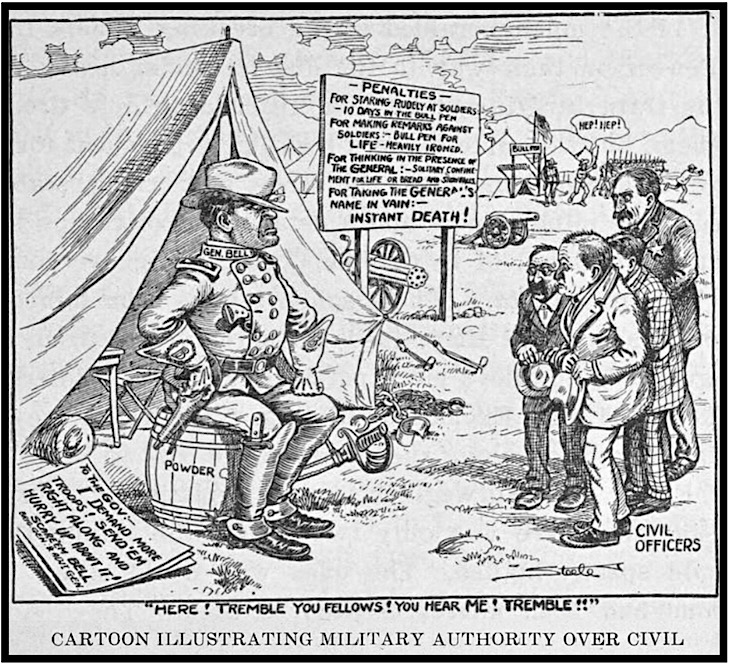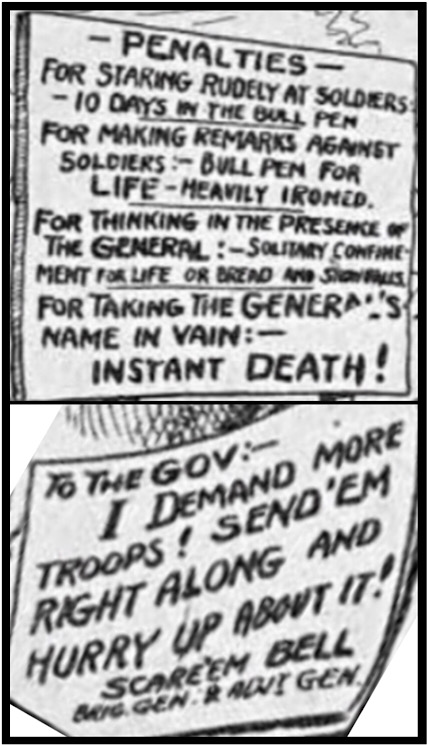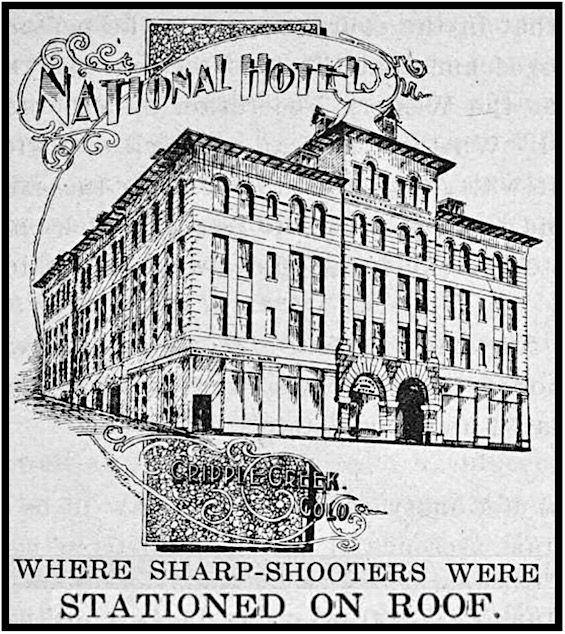 —————
—————
Hellraisers Journal – Wednesday September 30, 1903
Cripple Creek, Colorado – General Bell Captures Town as Miners Marched to Court
Cartoon by A. W. Steele of the The Denver Post:
Report of Emma F. Langdon of Victor, Colorado:
Friday Sept. 18, was the day the prisoners [Messrs. Parker, Campbell, Lafferty and McKinney] were to be produced by the military. The writs issued by Judge Seeds being returnable on that date. Tom McClelland appeared in the district court that morning to represent Generals Chase and Bell, who were not present, and asked for a continuance of the habeas corpus cases for five days. This was refused by Judge Seeds, on the grounds that the respondents had made no return upon the writ, neither producing the prisoners in court, or showing cause why the order of the court had not been complied with. McClelland then stated to the court that if given until 2 o’clock in the afternoon, he would make a return on the writ and then argue the question of continuance.
When court convened at 10 o’clock McClelland arose and, with folded arms, addressed the court, stating that he represented the respondents, Chase and Bell, and on their behalf asked for a continuance. He said: “A great many question are involved in this case, and owing to the duties of the military camp I have not had the time to prepare such an answer as I would like to present to this court. Under this statute it is discretionary with the court to allow five days for an answer. I would, therefore, ask until Monday morning or longer to do so.”
General Eugene Engley, counsel for the prisoners, objected. He said: “There has not been sufficient showing to warrant the continuance sought by Brother McClelland. The statute is very clear on this point. It says that only upon the return of the writ a day shall be set for a hearing. A continuance must be made after a return of the writ, which has not been made. Whether an imprisonment has been made by the military forces or by civil officers, that person ought to know before making an arrest what is the authority for doing so, and he should be ready at any time to make a showing of his position.” McClelland said that upon the return that day the court might make an order for continuance, either for making a return or for a hearing.
John Murphy, general attorney for the Western Federation said: “The order of this court was to produce these prisoners. The respondents are in contempt because they have not done so, and have given no reason to the court why they have failed to produce the prisoners. Without warrants citizens of this commonwealth have been thrown into prison. The military is only the reserve police of the state, and cannot hold a man longer than absolutely necessary to take him before a magistrate.’’ The court said that section 2108 of the code contemplates a return of the parties to whom a writ is directed. He added: “That would be a foundation for the court to consider the questions at issue. Upon that the court would be advised that there are matters subject to trial. It would then be within the province of the court to fix a time for a hearing. Moreover, it is the judgment of the court that on a proper showing the time of the return may be extended, but that the showing must be one upon which the court should be advised that more time may be necessary. Mr. McClelland’s showing is not sufficient. It should be supported by facts and circumstances.”
McClelland stated that if a continuance was given until 2 o’clock he would make a return of the writ. The court said: “Very well, I will grant a continuance to that hour. I think the parties who instituted these proceedings are entitled to a return. I will give the respondents until 2 o’clock to make it.” At 2 o’clock the court convened again and the military attorney was not ready, but entered a plea for further delay, and Judge Seeds again granted his request, this time giving him until Monday Sept. 21, at 9 o’clock. This delay aroused considerable speculation as to the cause.
The largest crowd ever assembled at a hearing in the Teller county district court room had assembled on this date to see what the outcome would be. Every seat in the court room was occupied.
9:30 o’clock a. m. Sept. 21 came, Judge Seeds was on the bench the sheriff at his station and court was duly in session—but Chase, Bell and the prisoners were not present. Tom McClelland, however, appeared as counsel for Chase and offered argument as to the non-appearance of Chase and his prisoners.
Counsel for the prisoners demanded that the prisoners be brought into court, and Judge Seeds sustained them. Attorney Murphy presented a motion that an attachment for John Chase be issued directing the sheriff to arrest Gen. Chase and bring him into court, on the ground that he had failed to produce the prisoners in court and was therefore in contempt.
Mr. Murphy read the statute relating to refusal of officers to obey a writ of habeas corpus. He said it was stated in court Saturday, Sept. 19, that the military was here to aid the court and the civil authorities and desired to assist them. “If this is true,” he said, “that they are here to obey the mandate of the court, there is nothing for them to do but to bring the prisoners into court, just as the sheriff would obey a writ of habeas corpus.”
McClelland replied that his position raised all these questions and he desired to present his case. Judge Seeds interrupted saying, “The court cannot agree with Mr. McClelland. These men are entitled to be heard as to themselves. In order to avoid any misunderstanding I called upon Gen. Chase Saturday and told him to appear in court Monday morning, Sept. 21, and produce the prisoners, but he has not done so. The court will not proceed in this case until the petitioners are in the court room. It is due him and it is due you, in obedience to this court that those men be present, and the court will not conduct any proceedings in their absence. It is just as imperative that you produce the bodies of the prisoners as directed in the writ as that you make a return on the writ. The points are one and inseparable.”
Judge Seeds asked McClelland if there were any preliminary matters he desired to take up before arguing the motion of petitioners to quash the return of the writ. McClelland said he desired to go on with the argument, and would like to take up the issue now.
Judge Seeds replied: “The court absolutely refuses—unless it is compelled to by conditions beyond its control—to listen to any arguments in the absence of the prisoners.”
Lieut. McClelland requested permission to file an amendment to the return setting forth that arrest and detention of the prisoners had been the result of the judgment of the commanding officer in putting into effect the order issued by the governor placing the troops in the field. The court granted this permission, and McClelland stated in reference to the order of the court regarding the prisoners: “Your Honor, I will communicate this notice to the commanding general, whose legal representative I am.”
A recess was taken to 2 p. m.
After Judge Seeds’ decision all the military officers were closeted for two hours, discussing the situation and talking with Gen. Chase by telephone and S. D. Crump, who was associate counsel in the case. It was decided to comply with the order of the court, and Gen. Chase announced that he would go over on the train with the four prisoners, Parker, Campbell, McKinney and Lafferty, in time for the assembling of court at 2 o’clock, and that he would bring them under a strong escort, and send a detachment of cavalry to act as guard in the vicinity of the court house.
[Emphasis added.]
Further Report of Emma F. Langdon of Victor, Colorado:
[Town of Cripple Creek Captured by General Bell.]
At about 1 p. m. [Monday September 21st] the people saw that preparations were being made for the arrival of General Chase and his prisoners. A blare of trumpets, the thunderous sound of dashing troops, the rumbling roar of wheels, quick fierce and stern commands of “Halt!” “Clear the street!” “Guard that alley!” “Guard that street!” “Ready! load!’’ “Sharp shooters seize the vantage of yon roof!” “Seize this” ‘‘seize that!” “seize any old thing!”
By the time the people realized that the fierce and mighty onslaught was not the arrival of Gabriel and the avenging hosts, they had been pushed, yanked and prodded from the streets; women were hysterical; children were screaming from fright; refuge had been sought by them in saloons, doors, stores and hall-ways—and then? Cripple Creek had been captured! sharpshooters had bravely and in the face of fearful odds gained possession of every point of advantage, the roof of the National hotel swarmed with them, gallant soldiers with loaded and bayoneted muskets paraded the sidewalks, death-dealing gatling guns, (late of Wyoming) commanded the streets. The hospital corps with stretchers, lints and all were there in readiness for the ghastly duties and superhumanly wise was the man, woman, child; aye, even mouse, bird, or yellow dog who could move a lash or pick a feather unless detected by the vigilant eyes of fighters of Colorado’s “bloody wars.”
At 1:30 p. m. Chase arrived with the prisoners. But what an, arrival!
This is supposed to be a free republic and never before in the annals of time have prisoners been escorted to a court of justice in such a manner as were Sherman Parker, Lafferty, Campbell and McKinney…..
Two troops of cavalry came dashing down Bennett avenue in full field equipment, jangling, glittering sabers, loaded sidearms, belted and arrayed for bloody conflict. Guards were hurriedly rushed to every entrance….
The prisoners arrived on the 1:30 train and much was the surprise of the people to see instead of four bound, shackled and handcuffed assassins and robbers, anarchists or desperadoes, four ordinary miners, for whose appearance all this military bravado, and brilliant display had been made marching up the street between a file of grinning young fellows with guns on the shoulders and dressed in the blue supposed to be the uniform of the American soldier…
There sat the court supported by his sheriffs—all that had been needed, but aside from this, twenty armed men, cavalry, side arms and carbines or worse, stood in solemn phalanx with their backs to the court and arms at present.
Outside all the cavalry of the militia were in waiting.
Waiting for what?
To shoot down citizens?
Understand.
Hardly had the cavalcade started on Bennett avenue when the order was given to put bullets in the guns…When court convened at 2 o’clock Lieut. McClelland took the floor and argued that martial law existed here as soon as the governor issued his order sending out the troops and from that standpoint he practically occupied the attention of the court the entire afternoon. The court adjourned at 6 o’clock to convene at 9:30 the next morning. The prisoners were again marched to the “bull pen.”
The next morning [Tuesday, Sept 22] it was reported the military had decided to recognize the civil authorities to the extent of turning over to them three of the four prisoners. The three to be proceeded against criminally and affidavits to be filed with the district attorney on which to prepare imformations and have capiases issued. This announcement was made in court Tuesday morning by counsel for the military. It was not stated which of the prisoners were to be given to the sheriff, and none of the officers would give any information on the subject, but it was understood that Campbell, Lafferty and McKinney were the three and that Sherman Parker would be produced in court on the habeas corpus contest and the hearing would be proceeded with.
Court did not convene until nearly 11 o’clock and the delay was occasioned by complications of the military counsel on the move it proposed to make. When the hour for opening the court passed and Chase had not appeared with his prisoners and escort, there were rumors that the military had decided to defy the court and decline to proceed further with the habeas corpus proceedings; but after court opened the examinations were made. After much argument by attorneys for military and prisoners, Judge Seeds ruled that unless three of the men were turned over to the sheriff by 2 o’clock he would proceed with the hearing in all four cases.
Counsel for the military said that they would have the affidavits ready for the district attorney not later than 12:30 or 1 o’clock, and that it would then be up to him to prepare the information and secure capiases for the accused,
The court then adjourned to convene at 2 o’clock. At 2 o’clock the streets were lined with people and the court room was crowded but no officers and prisoners arrived. Later Judge Seeds received a message from Camp Goldfield to the effect that the officers could not get their evidence together until 10 o’clock, Wednesday, 23, and again the court granted them time.
The gaudy glare of war and the apparent domination of the military powers were again in evidence upon the opening of court Wednesday morning (September 23). Bennett avenue was again crowded with cavalry troopers and infantry. A gating gun was stationed with its muzzle pointing toward the Midland depot. A detail of sharp shooters who are recognized as the most expert marksmen was placed on the roof of the National hotel, four stories above the grade of Bennett avenue. These men were perched upon the cupolas stationed at intervals on the roof of the building and had their guns pointed toward the streets for immediate use. The court house was guarded by men who confronted intruders with bayonets, and the citizens who attempted to cross the lines were brought face to face with the power which the militia saw fit to exercise.
As soon as the train rolled into the depot half of the troopers dashed up the street with General Chase at their head and threw their lines across the frontage of the Midland depot. The prisoners were escorted to the court room with two files of infantry on either side. The troopers followed. The court room was crowded with spectators and soldiers with bayonets glistening wickedly.
The fact that the court should again tolerate a display which had so thoroughly angered the citizens stirred the wrath of General Engley. He informed the court that he would not proceed because of the intimidating forces present in and about the court room. He characterized the court as an armed camp and stated calmly that the constitution provides that the court shall be free and untrammeled and open to everyone for the transaction of public business.
[General Engley said:]
There has befallen my duty to make the closing arguments for the petitioners. When I filed the application for writs of habeas corpus and invoked the jurisdiction of this court for the issuance of the highest writ of right known to law, I supposed that these proceedings would be heard under constitutional guarantee; but it is not so. The court may say that it is, but the facts remain that the forces of intimidation are present. The constitutional guarantee that the court shall be open and untrammeled has been invaded.
This is no longer a constitution court. It is an armed camp. The court has been surrounded by soldiery.
After long and sharp colloquies by all attorneys, Judge Seeds adjourned court until Thursday morning, and back to the “bull pen’’ went the prisoners.
[Emphasis added.]
~~~~~~~~~~~~~~~~~~~~~~~~~
SOURCES & IMAGES
Quote Mother Jones, Powers of Privilege ed, Ab Chp III
https://www.iww.org/history/library/MotherJones/autobiography/3
The Cripple Creek Strike, 1903-1904
-by Emma F. Langdon
Victor, CO, 1904
p126-132
https://archive.org/details/cripplecreekstri00lang/mode/1up?view=theater
https://archive.org/details/cripplecreekstri00lang/page/126/mode/1up?view=theater
Cartoon Steele, Military Authority, EFL p123, 1904
https://archive.org/details/cripplecreekstri00lang/page/123/mode/1up?view=theater
Cartoon Steele, Military Sharp Shooters on Roof, EFL p133, 1904
https://archive.org/details/cripplecreekstri00lang/page/133/mode/1up?view=theater
See also:
Hellraisers Journal: Emma F. Langdon Reports on
Military Despotism in the Cripple Creek Strike District of Colorado
Albert Wilbur Steele (1862-1925)
https://en.wikipedia.org/wiki/A._W._Steele
https://coloradoencyclopedia.org/article/wilbur-steele
https://archive.org/details/cripplecreekstri00lang/page/248/mode/1up?view=theater
Tag: Emma F Langdon
https://weneverforget.org/tag/emma-f-langdon/
Tag: Cripple Creek Strike of 1903-1904
https://weneverforget.org/tag/cripple-creek-strike-of-1903-1904/
~~~~~~~~~~~~~~~~~~~~~~~~~
Up The Union – Street Dogs



